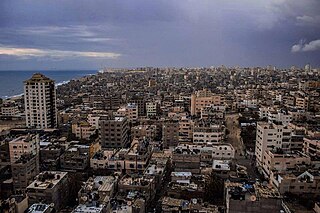
Khan Yunis, also spelled Khan Younis or Khan Yunus, is a Palestinian city serving as the capital of the Khan Yunis Governorate in the southern Gaza Strip. It has been largely destroyed on account of the ongoing Israel–Hamas war.
Al-Mawasi is a fertile area for agriculture in the Gaza Strip, approximately one kilometer wide and fourteen kilometers long. Prior to Israel's unilateral disengagement plan in 2005, it existed as a Palestinian enclave within the Katif bloc of Israeli settlements. According to the Palestinian Central Bureau of Statistics, al-Mawasi had a population of 1,409 in mid-year 2006.
The following outline is provided as an overview of and topical guide to the Wikipedia articles available about the Israel–Hamas war. It is an evolving list.
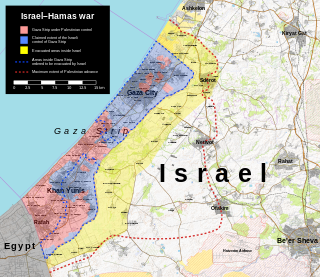
The Israeli invasion of the Gaza Strip is a major part of the Israel–Hamas war. Starting on 7 October 2023, immediately after the Hamas-led attacks, Israel began the bombing of Gaza Strip; on 13 October, Israel began ground operations in Gaza, and on 27 October, a full-scale invasion was launched. Israel's campaign, called Operation Swords of Iron, has two stated goals: to destroy Hamas and to free the hostages. More than 35,000 Palestinians have been killed in Gaza since the Israeli operation began, including more than 7,800 children and 4,900 women, with another 10,000 people missing and presumed dead under the rubble of destroyed buildings. There are allegations that Israel has committed war crimes and genocide during the invasion.
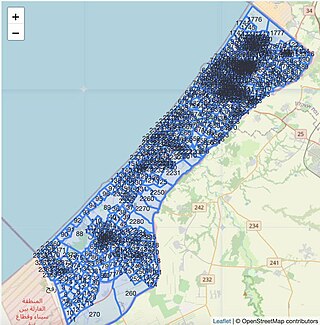
During the Israel–Hamas war, the Israeli military ordered most residents of Gaza to evacuate their homes, displacing hundreds of thousands of people and contributing to a broader humanitarian crisis in the territory. It is the largest displacement of Palestinians in 75 years. 90 percent of Gaza's population has been displaced at least once since October 2023. Palestinians have described the evacuation as the "second Nakba."
Events of the year 2024 in Israel.
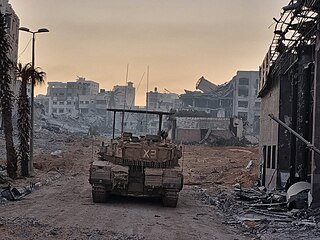
The battle of Khan Yunis, which evolved into the siege of Khan Yunis in late January, began on 1 December 2023 in the midst of the Israeli invasion of the Gaza Strip.
Events in 2024 in the Palestinian territories.
The following is a list of events during the Israeli–Palestinian conflict in 2024, including the 2024 events of the Israel–Hamas war.
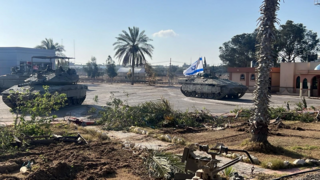
On 6 May 2024, Israel began a military offensive in and around the city of Rafah as part of its invasion of the Gaza Strip during the Israel–Hamas war.
The Hamad City incursion was a two–week Israeli military operation against Hamas forces in the apartment complex and neighborhood of Hamad City, Khan Yunis, in the Gaza Strip.
Hamad City or Hamad Town is an apartment complex and neighbourhood in northwestern Khan Yunis, a city in the Gaza Strip. Named after its benefactor, Hamad bin Khalifa Al Thani of Qatar, the complex was envisioned as a housing solution for middle to lower-income Palestinian families.

On 13 July 2024, Israeli airstrikes hit the Al-Mawasi area near Khan Yunis in the Gaza Strip during the Israel–Hamas war. The attack killed at least 90 Palestinians, among them women and children, and injured over 300. Israel said that the strike targeted Hamas top leaders. Survivors reported that they were targeted without warning in an area they were told was safe.
The Second Battle of Khan Yunis was a military engagement in the Gaza Strip that began on 22 July 2024 as part of the ongoing Israel–Hamas war. It marked the return of the Israel Defense Forces (IDF) to the Khan Yunis area inside the Gaza Strip after a previous battle and siege which lasted from December 2023 to April 2024 and ended with an Israeli withdrawal.
Rafa Salama is or was a Palestinian militant and the head of the Khan Yunis branch of the Al-Qassam Brigades, the military wing of Hamas. Israel claims to have assassinated him in an airstrike on Al-Mawasi refugee camp on 13 July 2024, during the Israel–Hamas war.





